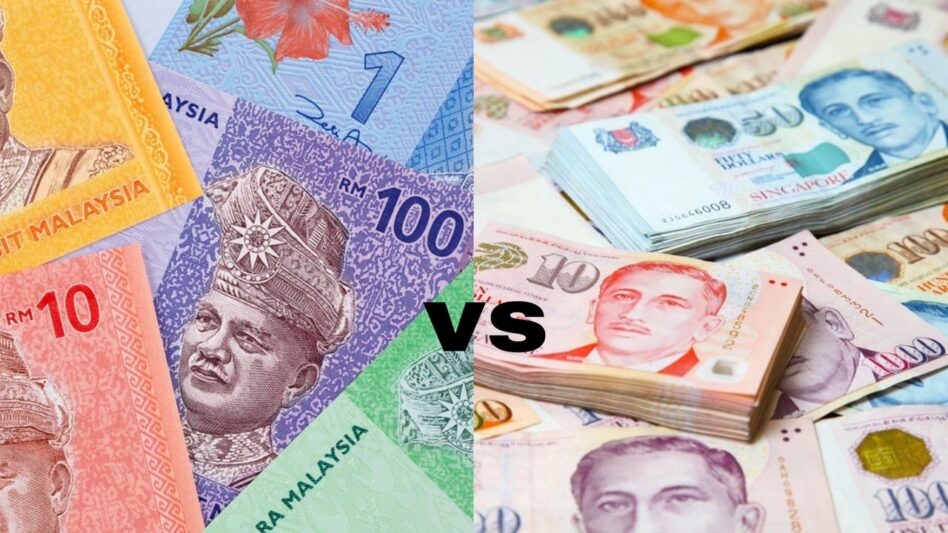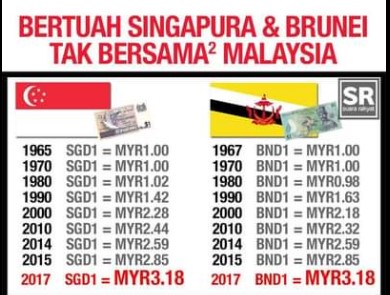
“Water face drop” as ringgit depreciates to record low against Sing dollar

ECONOMIC fundamentals aside, news that the Singapore dollar (SGD) has hit an all-time high against the ringgit is a bitter pill to swallow especially among baby boomer and Generation X Malaysians.
Yesterday (April 25), Bloomberg reported that after hitting a five-year high last week, the SGD continued its upward trend against the ringgit by posting an all-time high of 3.1688.
While older generation Malaysians can typically accept the fact that the ringgit, too, has slide to an alarming low of RM4.3568 against the greenback yesterday, the slump against SGD evokes deeply rooted emotional sentiment which can be traced back to Aug 9, 1965 when Singapore separated from Malaysia to become an independent and sovereign state.
A Facebook posting which depicts the ringgit’s downfall against SGD
The separation was the result of deep political and economic differences between the ruling political parties back then which created communal tensions that resulted in racial riots in July and September 1964.
Nobody expects Singapore which is unblessed with natural resources to say the least, to emulate Japan to rise from the ashes of the atomic bombings of Hiroshima and Nagasaki during World War II, to become developed economies at par with their US and European counterparts.
While the Singaporean and Malaysian currencies were on par right up to around 1980, that changed over the next 40 years with both the ringgit and SGD moving terribly out of line with the SGD triumphing over three times in value.
This has broadly reflected the widening gap in economic development between Malaysia and Singapore, with the latter far outpacing its northern neighbour Malaysia in all areas including educational levels, infrastructure, GDP (gross domestic product) per capita and quality of life, among others.
Fast track to present times, the timing of the depreciation is seen as ‘rather inauspicious’ considering that Malaysia has only begun its transition to endemicity which culminates in the re-opening of the Singapore-Malaysia land borders since April 1 for fully vaccinated travellers while cross-border bus services will resume from May 1.
Financial journalist, independent writer and consultant P. Gunasegaram summed up the current sentiment most nonchalantly in an opinion piece carried by Malaysiakini entitled “A Kleptocracy Premium for the Ringgit” (Sept 5, 2017) which is still relevant till today:
“Currency weakness is a symptom of a larger illness. If the disease is not treated and the rot is not stopped, the ringgit will keep on sliding lower and will impoverish Malaysia on a relative basis for many years to come.
“The bottom line, after taking into account short-term fluctuations, is that a country which is doing well economically and has in place the right policies to foster the competitiveness of its people through a variety of measures which includes excellent education, infrastructure, good governance, integrity and competence among others, will see its currency appreciate.
“Up to about 1980, we were doing well as a country. Even after the May 13, 1969 racial riots which resulted in suppression and ad hoc policy-making and worse implementation, our broad economy improved and the currency strengthened. Note, we were about par with Singapore in 1980.
“And then the rot set in firmly and we have been on a long decline which started with the Asian financial crisis of 1997/1998; but unlike Thailand and Singapore whose currencies are now stronger, we have regressed.
“The ringgit’s value and weak trend is nothing but a reflection of Malaysia’s poor future economic fundamentals and represents effectively a huge risk premium for kleptocracy and all that means for the future of the country.” – April 26, 2022
The separation was the result of deep political and economic differences between the ruling political parties back then which created communal tensions that resulted in racial riots in July and September 1964.
Nobody expects Singapore which is unblessed with natural resources to say the least, to emulate Japan to rise from the ashes of the atomic bombings of Hiroshima and Nagasaki during World War II, to become developed economies at par with their US and European counterparts.
While the Singaporean and Malaysian currencies were on par right up to around 1980, that changed over the next 40 years with both the ringgit and SGD moving terribly out of line with the SGD triumphing over three times in value.
This has broadly reflected the widening gap in economic development between Malaysia and Singapore, with the latter far outpacing its northern neighbour Malaysia in all areas including educational levels, infrastructure, GDP (gross domestic product) per capita and quality of life, among others.
Fast track to present times, the timing of the depreciation is seen as ‘rather inauspicious’ considering that Malaysia has only begun its transition to endemicity which culminates in the re-opening of the Singapore-Malaysia land borders since April 1 for fully vaccinated travellers while cross-border bus services will resume from May 1.
Financial journalist, independent writer and consultant P. Gunasegaram summed up the current sentiment most nonchalantly in an opinion piece carried by Malaysiakini entitled “A Kleptocracy Premium for the Ringgit” (Sept 5, 2017) which is still relevant till today:
“Currency weakness is a symptom of a larger illness. If the disease is not treated and the rot is not stopped, the ringgit will keep on sliding lower and will impoverish Malaysia on a relative basis for many years to come.
“The bottom line, after taking into account short-term fluctuations, is that a country which is doing well economically and has in place the right policies to foster the competitiveness of its people through a variety of measures which includes excellent education, infrastructure, good governance, integrity and competence among others, will see its currency appreciate.
“Up to about 1980, we were doing well as a country. Even after the May 13, 1969 racial riots which resulted in suppression and ad hoc policy-making and worse implementation, our broad economy improved and the currency strengthened. Note, we were about par with Singapore in 1980.
“And then the rot set in firmly and we have been on a long decline which started with the Asian financial crisis of 1997/1998; but unlike Thailand and Singapore whose currencies are now stronger, we have regressed.
“The ringgit’s value and weak trend is nothing but a reflection of Malaysia’s poor future economic fundamentals and represents effectively a huge risk premium for kleptocracy and all that means for the future of the country.” – April 26, 2022

The sad thing is that there seems to be a lack of politicsl will to right the situation.
ReplyDeleteUnfortunately, most Malaysians have a strong negative impression of all politicians and this is not likely to change anytime soon.